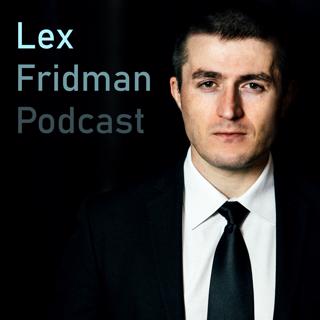
#90 – Dmitry Korkin: Computational Biology of Coronavirus
Dmitry Korkin is a professor of bioinformatics and computational biology at Worcester Polytechnic Institute, where he specializes in bioinformatics of complex disease, computational genomics, systems biology, and biomedical data analytics. I came across Dmitry's work when in February his group used the viral genome of the COVID-19 to reconstruct the 3D structure of its major viral proteins and their interactions with human proteins, in effect creating a structural genomics map of the coronavirus and making this data open and available to researchers everywhere. We talked about the biology of COVID-19, SARS, and viruses in general, and how computational methods can help us understand their structure and function in order to develop antiviral drugs and vaccines. Support this podcast by signing up with these sponsors: - Cash App - use code "LexPodcast" and download: - Cash App (App Store): https://apple.co/2sPrUHe - Cash App (Google Play): https://bit.ly/2MlvP5w EPISODE LINKS: Dmitry's Website: http://korkinlab.org/ Dmitry's Twitter: https://twitter.com/dmkorkin Dmitry's Paper that we discuss: https://bit.ly/3eKghEM This conversation is part of the Artificial Intelligence podcast. If you would like to get more information about this podcast go to https://lexfridman.com/ai or connect with @lexfridman on Twitter, LinkedIn, Facebook, Medium, or YouTube where you can watch the video versions of these conversations. If you enjoy the podcast, please rate it 5 stars on Apple Podcasts, follow on Spotify, or support it on Patreon. Here's the outline of the episode. On some podcast players you should be able to click the timestamp to jump to that time. OUTLINE: 00:00 - Introduction 02:33 - Viruses are terrifying and fascinating 06:02 - How hard is it to engineer a virus? 10:48 - What makes a virus contagious? 29:52 - Figuring out the function of a protein 53:27 - Functional regions of viral proteins 1:19:09 - Biology of a coronavirus treatment 1:34:46 - Is a virus alive? 1:37:05 - Epidemiological modeling 1:55:27 - Russia 2:02:31 - Science bobbleheads 2:06:31 - Meaning of life
22 Huhti 20202h 9min

#89 – Stephen Wolfram: Cellular Automata, Computation, and Physics
Stephen Wolfram is a computer scientist, mathematician, and theoretical physicist who is the founder and CEO of Wolfram Research, a company behind Mathematica, Wolfram Alpha, Wolfram Language, and the new Wolfram Physics project. He is the author of several books including A New Kind of Science, which on a personal note was one of the most influential books in my journey in computer science and artificial intelligence. Support this podcast by signing up with these sponsors: - ExpressVPN at https://www.expressvpn.com/lexpod - Cash App - use code "LexPodcast" and download: - Cash App (App Store): https://apple.co/2sPrUHe - Cash App (Google Play): https://bit.ly/2MlvP5w EPISODE LINKS: Stephen's Twitter: https://twitter.com/stephen_wolfram Stephen's Website: https://www.stephenwolfram.com/ Wolfram Research Twitter: https://twitter.com/WolframResearch Wolfram Research YouTube: https://www.youtube.com/user/WolframResearch Wolfram Research Website: https://www.wolfram.com/ Wolfram Alpha: https://www.wolframalpha.com/ A New Kind of Science (book): https://amzn.to/34JruB2 This conversation is part of the Artificial Intelligence podcast. If you would like to get more information about this podcast go to https://lexfridman.com/ai or connect with @lexfridman on Twitter, LinkedIn, Facebook, Medium, or YouTube where you can watch the video versions of these conversations. If you enjoy the podcast, please rate it 5 stars on Apple Podcasts, follow on Spotify, or support it on Patreon. Here's the outline of the episode. On some podcast players you should be able to click the timestamp to jump to that time. OUTLINE: 00:00 - Introduction 04:16 - Communicating with an alien intelligence 12:11 - Monolith in 2001: A Space Odyssey 29:06 - What is computation? 44:54 - Physics emerging from computation 1:14:10 - Simulation 1:19:23 - Fundamental theory of physics 1:28:01 - Richard Feynman 1:39:57 - Role of ego in science 1:47:21 - Cellular automata 2:15:08 - Wolfram language 2:55:14 - What is intelligence? 2:57:47 - Consciousness 3:02:36 - Mortality 3:05:47 - Meaning of life
18 Huhti 20203h 11min

#88 – Eric Weinstein: Geometric Unity and the Call for New Ideas, Leaders & Institutions
Eric Weinstein is a mathematician with a bold and piercing intelligence, unafraid to explore the biggest questions in the universe and shine a light on the darkest corners of our society. He is the host of The Portal podcast, a part of which, he recently released his 2013 Oxford lecture on his theory of Geometric Unity that is at the center of his lifelong efforts in arriving at a theory of everything that unifies the fundamental laws of physics. Support this podcast by signing up with these sponsors: - Cash App - use code "LexPodcast" and download: - Cash App (App Store): https://apple.co/2sPrUHe - Cash App (Google Play): https://bit.ly/2MlvP5w EPISODE LINKS: Eric's Twitter: https://twitter.com/EricRWeinstein Eric's YouTube: https://www.youtube.com/ericweinsteinphd The Portal podcast: https://podcasts.apple.com/us/podcast/the-portal/id1469999563 Graph, Wall, Tome wiki: https://theportal.wiki/wiki/Graph,_Wall,_Tome This conversation is part of the Artificial Intelligence podcast. If you would like to get more information about this podcast go to https://lexfridman.com/ai or connect with @lexfridman on Twitter, LinkedIn, Facebook, Medium, or YouTube where you can watch the video versions of these conversations. If you enjoy the podcast, please rate it 5 stars on Apple Podcasts, follow on Spotify, or support it on Patreon. Here's the outline of the episode. On some podcast players you should be able to click the timestamp to jump to that time. OUTLINE: 00:00 - Introduction 02:08 - World War II and the Coronavirus Pandemic 14:03 - New leaders 31:18 - Hope for our time 34:23 - WHO 44:19 - Geometric unity 1:38:55 - We need to get off this planet 1:40:47 - Elon Musk 1:46:58 - Take Back MIT 2:15:31 - The time at Harvard 2:37:01 - The Portal 2:42:58 - Legacy
13 Huhti 20202h 47min

#87 – Richard Dawkins: Evolution, Intelligence, Simulation, and Memes
Richard Dawkins is an evolutionary biologist, and author of The Selfish Gene, The Blind Watchmaker, The God Delusion, The Magic of Reality, The Greatest Show on Earth, and his latest Outgrowing God. He is the originator and popularizer of a lot of fascinating ideas in evolutionary biology and science in general, including funny enough the introduction of the word meme in his 1976 book The Selfish Gene, which in the context of a gene-centered view of evolution is an exceptionally powerful idea. He is outspoken, bold, and often fearless in his defense of science and reason, and in this way, is one of the most influential thinkers of our time. Support this podcast by signing up with these sponsors: - Cash App - use code "LexPodcast" and download: - Cash App (App Store): https://apple.co/2sPrUHe - Cash App (Google Play): https://bit.ly/2MlvP5w EPISODE LINKS: Richard's Website: https://www.richarddawkins.net/ Richard's Twitter: https://twitter.com/RichardDawkins Richard's Books: - Selfish Gene: https://amzn.to/34tpHQy - The Magic of Reality: https://amzn.to/3c0aqZQ - The Blind Watchmaker: https://amzn.to/2RqV5tH - The God Delusion: https://amzn.to/2JPrxlc - Outgrowing God: https://amzn.to/3ebFess - The Greatest Show on Earth: https://amzn.to/2Rp2j1h This conversation is part of the Artificial Intelligence podcast. If you would like to get more information about this podcast go to https://lexfridman.com/ai or connect with @lexfridman on Twitter, LinkedIn, Facebook, Medium, or YouTube where you can watch the video versions of these conversations. If you enjoy the podcast, please rate it 5 stars on Apple Podcasts, follow on Spotify, or support it on Patreon. Here's the outline of the episode. On some podcast players you should be able to click the timestamp to jump to that time. OUTLINE: 00:00 - Introduction 02:31 - Intelligent life in the universe 05:03 - Engineering intelligence (are there shortcuts?) 07:06 - Is the evolutionary process efficient? 10:39 - Human brain and AGI 15:31 - Memes 26:37 - Does society need religion? 33:10 - Conspiracy theories 39:10 - Where do morals come from in humans? 46:10 - AI began with the ancient wish to forge the gods 49:18 - Simulation 56:58 - Books that influenced you 1:02:53 - Meaning of life
9 Huhti 20201h 7min

#86 – David Silver: AlphaGo, AlphaZero, and Deep Reinforcement Learning
David Silver leads the reinforcement learning research group at DeepMind and was lead researcher on AlphaGo, AlphaZero and co-lead on AlphaStar, and MuZero and lot of important work in reinforcement learning. Support this podcast by signing up with these sponsors: - MasterClass: https://masterclass.com/lex - Cash App - use code "LexPodcast" and download: - Cash App (App Store): https://apple.co/2sPrUHe - Cash App (Google Play): https://bit.ly/2MlvP5w EPISODE LINKS: Reinforcement learning (book): https://amzn.to/2Jwp5zG This conversation is part of the Artificial Intelligence podcast. If you would like to get more information about this podcast go to https://lexfridman.com/ai or connect with @lexfridman on Twitter, LinkedIn, Facebook, Medium, or YouTube where you can watch the video versions of these conversations. If you enjoy the podcast, please rate it 5 stars on Apple Podcasts, follow on Spotify, or support it on Patreon. Here's the outline of the episode. On some podcast players you should be able to click the timestamp to jump to that time. OUTLINE: 00:00 - Introduction 04:09 - First program 11:11 - AlphaGo 21:42 - Rule of the game of Go 25:37 - Reinforcement learning: personal journey 30:15 - What is reinforcement learning? 43:51 - AlphaGo (continued) 53:40 - Supervised learning and self play in AlphaGo 1:06:12 - Lee Sedol retirement from Go play 1:08:57 - Garry Kasparov 1:14:10 - Alpha Zero and self play 1:31:29 - Creativity in AlphaZero 1:35:21 - AlphaZero applications 1:37:59 - Reward functions 1:40:51 - Meaning of life
3 Huhti 20201h 48min

#85 – Roger Penrose: Physics of Consciousness and the Infinite Universe
Roger Penrose is physicist, mathematician, and philosopher at University of Oxford. He has made fundamental contributions in many disciplines from the mathematical physics of general relativity and cosmology to the limitations of a computational view of consciousness. Support this podcast by signing up with these sponsors: - ExpressVPN at https://www.expressvpn.com/lexpod - Cash App - use code "LexPodcast" and download: - Cash App (App Store): https://apple.co/2sPrUHe - Cash App (Google Play): https://bit.ly/2MlvP5w EPISODE LINKS: Cycles of Time (book): https://amzn.to/39tXtpp The Emperor's New Mind (book): https://amzn.to/2yfeVkD This conversation is part of the Artificial Intelligence podcast. If you would like to get more information about this podcast go to https://lexfridman.com/ai or connect with @lexfridman on Twitter, LinkedIn, Facebook, Medium, or YouTube where you can watch the video versions of these conversations. If you enjoy the podcast, please rate it 5 stars on Apple Podcasts, follow on Spotify, or support it on Patreon. Here's the outline of the episode. On some podcast players you should be able to click the timestamp to jump to that time. OUTLINE: 00:00 - Introduction 03:51 - 2001: A Space Odyssey 09:43 - Consciousness and computation 23:45 - What does it mean to "understand" 31:37 - What's missing in quantum mechanics? 40:09 - Whatever consciousness is, it's not a computation 44:13 - Source of consciousness in the human brain 1:02:57 - Infinite cycles of big bangs 1:22:05 - Most beautiful idea in mathematics
31 Maalis 20201h 28min

#83 – Nick Bostrom: Simulation and Superintelligence
Nick Bostrom is a philosopher at University of Oxford and the director of the Future of Humanity Institute. He has worked on fascinating and important ideas in existential risks, simulation hypothesis, human enhancement ethics, and the risks of superintelligent AI systems, including in his book Superintelligence. I can see talking to Nick multiple times on this podcast, many hours each time, but we have to start somewhere. Support this podcast by signing up with these sponsors: - Cash App - use code "LexPodcast" and download: - Cash App (App Store): https://apple.co/2sPrUHe - Cash App (Google Play): https://bit.ly/2MlvP5w EPISODE LINKS: Nick's website: https://nickbostrom.com/ Future of Humanity Institute: - https://twitter.com/fhioxford - https://www.fhi.ox.ac.uk/ Books: - Superintelligence: https://amzn.to/2JckX83 Wikipedia: - https://en.wikipedia.org/wiki/Simulation_hypothesis - https://en.wikipedia.org/wiki/Principle_of_indifference - https://en.wikipedia.org/wiki/Doomsday_argument - https://en.wikipedia.org/wiki/Global_catastrophic_risk This conversation is part of the Artificial Intelligence podcast. If you would like to get more information about this podcast go to https://lexfridman.com/ai or connect with @lexfridman on Twitter, LinkedIn, Facebook, Medium, or YouTube where you can watch the video versions of these conversations. If you enjoy the podcast, please rate it 5 stars on Apple Podcasts, follow on Spotify, or support it on Patreon. Here's the outline of the episode. On some podcast players you should be able to click the timestamp to jump to that time. OUTLINE: 00:00 - Introduction 02:48 - Simulation hypothesis and simulation argument 12:17 - Technologically mature civilizations 15:30 - Case 1: if something kills all possible civilizations 19:08 - Case 2: if we lose interest in creating simulations 22:03 - Consciousness 26:27 - Immersive worlds 28:50 - Experience machine 41:10 - Intelligence and consciousness 48:58 - Weighing probabilities of the simulation argument 1:01:43 - Elaborating on Joe Rogan conversation 1:05:53 - Doomsday argument and anthropic reasoning 1:23:02 - Elon Musk 1:25:26 - What's outside the simulation? 1:29:52 - Superintelligence 1:47:27 - AGI utopia 1:52:41 - Meaning of life
26 Maalis 20201h 57min

#82 – Simon Sinek: Leadership, Hard Work, Optimism and the Infinite Game
Simon Sinek is an author of several books including Start With Why, Leaders Eat Last, and his latest The Infinite Game. He is one of the best communicators of what it takes to be a good leader, to inspire, and to build businesses that solve big difficult challenges. Support this podcast by signing up with these sponsors: - MasterClass: https://masterclass.com/lex - Cash App - use code "LexPodcast" and download: - Cash App (App Store): https://apple.co/2sPrUHe - Cash App (Google Play): https://bit.ly/2MlvP5w EPISODE LINKS: Simon twitter: https://twitter.com/simonsinek Simon facebook: https://www.facebook.com/simonsinek Simon website: https://simonsinek.com/ Books: - Infinite Game: https://amzn.to/2WxBH1i - Leaders Eat Last: https://amzn.to/2xf70Ds - Start with Why: https://amzn.to/2WxBH1i This conversation is part of the Artificial Intelligence podcast. If you would like to get more information about this podcast go to https://lexfridman.com/ai or connect with @lexfridman on Twitter, LinkedIn, Facebook, Medium, or YouTube where you can watch the video versions of these conversations. If you enjoy the podcast, please rate it 5 stars on Apple Podcasts, follow on Spotify, or support it on Patreon. Here's the outline of the episode. On some podcast players you should be able to click the timestamp to jump to that time. OUTLINE: 0:00 - Introduction 3:50 - Meaning of life as an infinite game 10:13 - Optimism 13:30 - Mortality 17:52 - Hard work 26:38 - Elon Musk, Steve Jobs, and leadership
21 Maalis 202038min





















